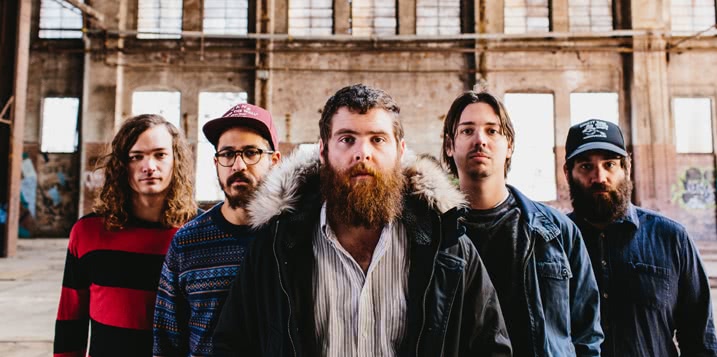We tend to conceive our lives within a narrative framework. We picture ourselves as the leading character in a story, on a purposeful journey and with a reasonable amount of control over our actions.
By analysing past events, we discern habitual behaviours and directly link these to who we are at present. Memories, however, are fallible things and reflections on the past are likely to be skewed by present concerns.
Manchester Orchestra singer-songwriter Andy Hull has been leading the band since he was 18 years old. Now 27, Hull’s known for writing big rock songs with a patent emotional core. As a result, his job involves being confronted by variations of his past self on a regular basis. And he’s often surprised by what it has it to say.
“Every time I’ve ever made a record or written about something,” he says, “it’s like a year later I’ll think of the lyric or the song and realise there was something else going; something bigger being written that I didn’t really know about as I was writing it.”
Earlier this year, Manchester Orchestra returned with their fourth LP, Cope. Prior to making the record, Hull and his four bandmates built themselves a studio in their hometown of Atlanta, Georgia. This allowed the five-piece – which also includes lead guitarist Robert McDowell, keyboard player Chris Freeman, drummer Tim Very and newest recruit, bassist Andy Prince – to piece the album together in one room, without any disruptions. Yet even though Cope is the product of group interaction, Hull retained creative authority.
“It was certainly still my songs,” he says. “I just have this band that’s so good that I was able to sort of write in real time. So I would come up with a riff and we would write this riff together and then I would be like, ‘Alright, hold up, let me write the lyrics here for the next 30 minutes,’ and they’d go take a break.”
It should be noted that, while Hull’s songs contain introspective tenderness, Manchester Orchestra specialise in a powerful brand of alt-rock. To gather such force, the input of all five digits is invaluable. “I do have the final say,” Hull explains, “but there is a lot of democracy that happens in coming up with that final say. I’m certainly not one to take any offence – none of us are – to [being told], ‘That’s not really working, we need to find something better than that.’
“We all made the decision three or four years ago, right after [2011’s] Simple Math, that our goal is what’s best for the song and what’s best for the band. Our goal isn’t what’s best for our egos and for looking cool or feeling cool.”
So Cope was made in the band’s own studio, under their own supervision, and they’ve distanced themselves from notions of cool. This all sounds rather mature, doesn’t it? ‘Growing up’ is often synonymous with becoming somewhat conservative and losing potency. Converse to this, Cope is far and away Manchester Orchestra’s loudest and most direct release so far.
“We felt before we started this record, ‘What do we want to add to the next thing that we’ve done?’” says Hull. “The thing that made the most sense to us was to make as fast and as catchy and as rocking of a record as we can. We wanted to take all of the bullshit out and take all of the fluff out of it and focus on the songs and the immediacy of it. We wanted to make an immediate record.”
This brings us back to the notion of narrative self-understanding. It’s essentially our awareness that we’re unique individuals with ongoing projects to perpetuate that gets us out of bed every day. Through reflection – be it dialogic or private – we learn about ourselves and devise effective ways to advance our story.
Songwriting is, of course, an act of reflection, which involves dipping into one’s finer feelings and extracting something of constructive import. So, for a writer like Hull, who doesn’t shy away from emotional content, songwriting has played a huge part in the cultivation of his identity.
“I started this band and then left on tour when people would be going to college after high school,” he says. “It’s just been what I’ve known. I’ve always written honestly and open-up-the-chest-and-look-inside lyrics. It’s been cool to watch the growth through it and it’s really exciting to think about where it’s going to go.”
In addition to effecting personal growth through songwriting, the fact Hull’s been touring since his late teens has also influenced his perspective on the world. Manchester Orchestra head back down to Australia next month. Having previously visited in 2009 and again in 2012, the band has left a big impression on Australian audiences. And it’s certainly not a one-way exchange. “There’s something to be said about the atmosphere and vibe of your country,” Hull says. “It’s pretty unbelievable. Everyone’s been so kind to us from Australia, since we were babies.
“The thing that we’re consistently blown away by with the fans [is that] people aren’t just fans of ours for what we’re doing at the present time, necessarily. They’re in it for the long run, which is really cool. That’s what brings us up to make records like Cope, because we know we can do something like that and it’s not going to freak everybody out.”
Cope out now through Loma Vista / Caroline. Catch them alongsideApes, Kevin Devine at theMetro Theatre onSaturday November 15, tickets online.


































